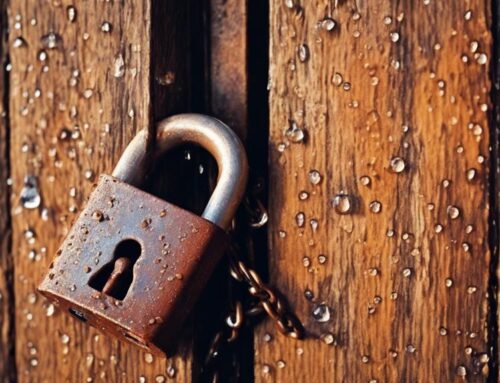You might notice your lock is failing if you're having difficulty turning the key or if it's sticking or jamming. Visible rust or corrosion can weaken the lock's integrity, while a loose or wobbly lock cylinder indicates it could break down soon. Additionally, listen for unusual noises, like grinding or rattling, which often signal internal problems. Ignoring these warning signs can lead to bigger issues, compromising your security. Taking action now can save you headaches later. Want to know how to address these problems effectively? There's more valuable information to help you keep your locks in top shape.
Key Takeaways
- Difficulty turning the key can indicate internal wear or misalignment, signaling potential lock failure.
- Visible rust or corrosion weakens lock integrity, often leading to reliability issues if left unaddressed.
- A loose or wobbly lock cylinder suggests imminent failure, requiring immediate tightening or realignment.
- Key sticking or jamming often results from dirt accumulation, indicating a need for cleaning and lubrication.
- Unusual noises, such as grinding or rattling, may signal internal malfunctions and require professional assessment.
Difficulty Turning the Key
If you're struggling to turn your key in the lock, it's a clear warning sign that something's not right. Failing door locks can be a serious issue, impacting not only your security but also your peace of mind.
You might feel frustrated as you twist the key, but it's vital to recognize this symptom before it escalates into a complete lock failure. Common mechanical failures can often be attributed to preventing common lock issues, such as internal wear, dirt buildup, or misalignment in the lock mechanism.
Ignoring these signs may lead to further complications, such as being unable to access your home or vehicle when you need it most.
As someone who cares about serving others, your safety and that of your loved ones should always come first. If you find yourself consistently having to push, jiggle, or apply extra force to turn your key, it's time to take action.
Whether it's cleaning the lock, lubricating it, or calling a locksmith, addressing these issues promptly can save you from future headaches.
Visible Rust or Corrosion
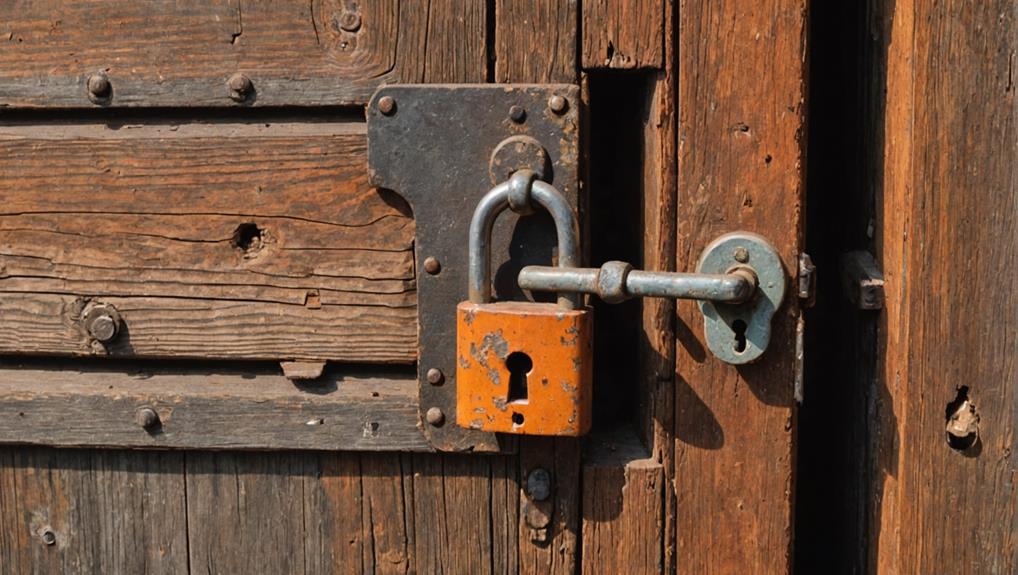
Noticing visible rust or corrosion on your lock is another red flag that indicates potential failure. This deterioration often results from exposure to moisture, humidity, or harsh weather conditions.
When to replace rusty locks is vital as rust can spread and worsen over time. If you see rust or corrosion, it's important to address the issue promptly. Ignoring it can lead to more significant lock wear and tear, making your lock unreliable when you need it most.
Rust can weaken the structural integrity of your lock, affecting its performance and security. A compromised lock can leave your home vulnerable, putting everything you care about at risk. If you're serving others, like family members or clients, guaranteeing their safety is paramount.
To combat rust, consider cleaning the affected areas with a rust remover and applying a protective lubricant designed for locks. However, if the damage is extensive, it might be time to replace the lock altogether.
Investing in a new, rust-resistant lock can save you from future headaches and enhance your peace of mind. Remember, maintaining the locks you depend on is a proactive way to guarantee the safety of those you care for. Keep an eye on those signs, and act before it's too late.
Loose or Wobbly Lock Cylinder
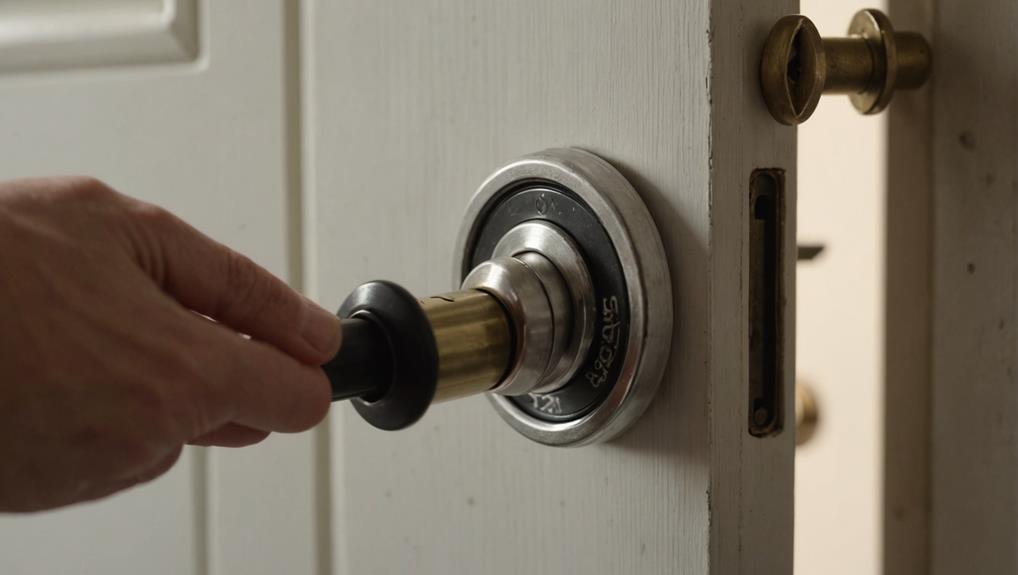
Often, a loose or wobbly lock cylinder signals that your lock is on the verge of failure. If you notice any movement when you turn the key or feel instability, it's essential to address it promptly. Ignoring these lock failing signs can lead to bigger issues down the line.
Here's a quick reference table to help you understand the potential causes and solutions:
| Symptoms | Causes | Solutions |
|---|---|---|
| Loose or wobbly lock cylinder | Wear and tear | Tighten screws or bolts |
| Difficulty in turning the key | Misalignment | Realign the lock mechanism |
| Lock sticking | Dirt or debris buildup | Clean the cylinder thoroughly |
| Cylinder not turning at all | Internal damage | Replace the lock completely |
| Key not fitting properly | Wrong key or key wear | Get a new key made |
Key Sticking or Jamming
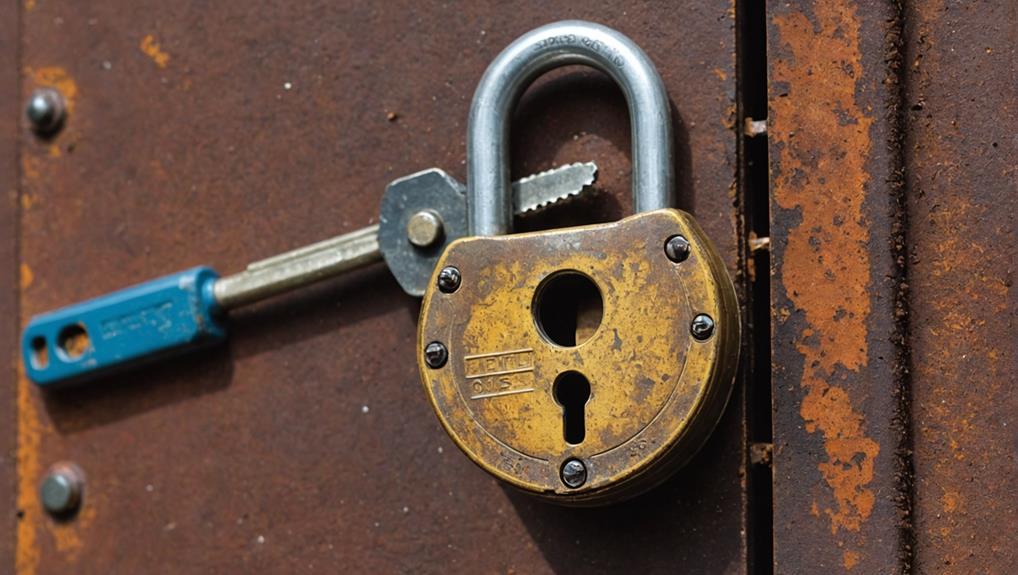
Key sticking or jamming is a common issue that can frustrate anyone trying to open a door. When you insert your key and it doesn't turn smoothly, it can leave you feeling helpless.
This issue often arises from dirt or debris accumulating in the lock, or it may indicate that the lock is wearing out. Regular maintenance and mastering lock care can help prevent these problems from escalating. If you're aiming to help others, it's crucial to recognize these signs early.
To address key sticking or jamming, start by cleaning the lock. Use a small amount of lubricant designed for locks, and avoid oils that can attract more dirt.
If the problem persists, it may signal deeper issues within the lock mechanism, which could require professional assistance.
Unusual Noises When Locked
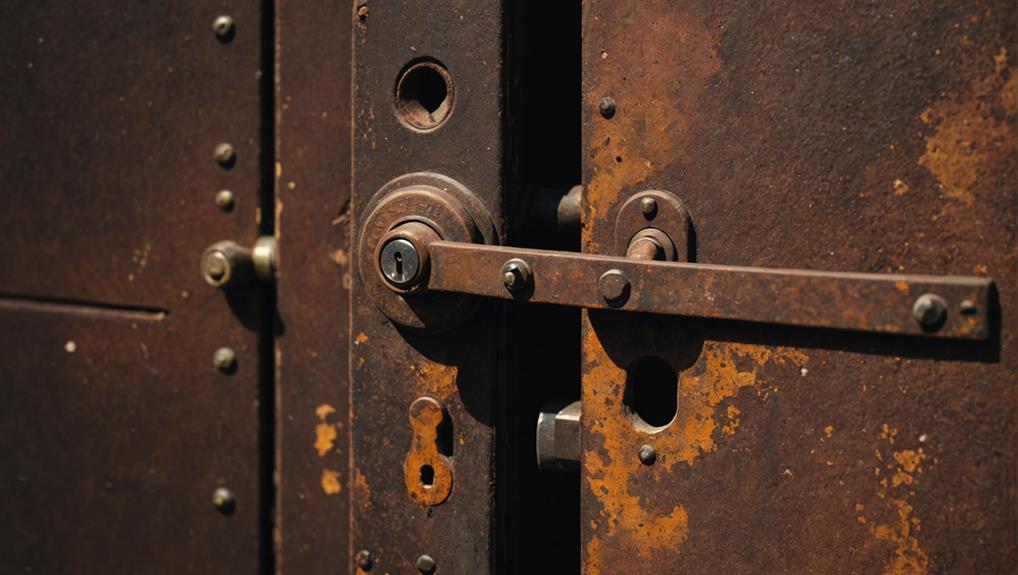
If you hear strange noises like grinding or rattling when you lock or open your door, it's a clear warning sign that your lock might be failing. These unusual sounds can indicate underlying issues that, if not addressed, could lead to a complete lock failure.
When you serve others, ensuring their safety begins with a reliable lock. It's crucial to recognize that these noises could stem from common problems that can be avoided with proper maintenance, such as avoiding common mistakes in DIY lock replacement.
Consider the possibility that dirt, debris, or rust is interfering with the lock's internal mechanisms. Regular maintenance, like lubrication and cleaning, can prevent these problems. However, persistent noises despite your efforts might signal deeper issues—perhaps worn gears or misalignment. These are all signs of a broken lock that shouldn't be ignored.
If you notice these noises, it's time to take action. Don't wait for the situation to worsen; your doors are the first line of defense for your loved ones and your property.
Reach out to a professional locksmith to assess the problem and provide a solution. Remember, addressing these warning signs early can save you time, money, and stress down the road. Prioritize safety, and don't hesitate to seek help when needed.
Frequently Asked Questions
How Often Should I Replace My Locks for Safety?
You should consider replacing your locks every few years to maintain safety.
If you've recently moved into a new home or experienced a break-in, it's wise to change them sooner.
Regularly check their condition and functionality, and don't hesitate to upgrade to more secure options if needed.
What Type of Lubricant Is Best for Locks?
When it comes to lubricating locks, you'll want to use a graphite-based lubricant.
It's dry and won't attract dirt or dust, keeping your locks functioning smoothly. Avoid oil-based lubricants, as they can gunk up the mechanism over time.
Just apply a small amount to the keyhole and work the key in and out to distribute it evenly.
This simple maintenance keeps your locks secure and extends their lifespan, ensuring they serve you well.
Can Weather Affect the Performance of My Lock?
Absolutely, weather can affect your lock's performance.
Extreme temperatures, rain, or humidity can cause rust or corrosion, making it tough to turn the key. You might notice your lock sticking or jamming during a chilly winter's night, just like trying to open a stubborn can of beans!
To keep it functioning smoothly, consider using a weather-resistant lubricant and regularly check your locks, ensuring they serve you well, no matter the season.
Are Smart Locks More Reliable Than Traditional Locks?
When you're considering reliability, smart locks often offer enhanced security features compared to traditional locks.
They typically include encryption and remote access, which can give you peace of mind. However, they do rely on batteries and Wi-Fi, so you'll need to maintain those.
Traditional locks, while simpler, can be more vulnerable to physical tampering.
Ultimately, it depends on your lifestyle and how much convenience and security you need in your daily life.
How Do I Choose the Right Locksmith for Repairs?
Choosing the right locksmith is like picking a trusted friend to help you move. You want someone reliable and experienced.
Start by asking for recommendations from friends or family, then check online reviews. When you find a few options, call them and ask about their services and rates.
Make certain they're licensed and insured; it'll give you peace of mind. Trust your instincts—if someone feels off, keep looking until you find the right fit.
Conclusion
As you stand before your door, a once trusty lock now feels like a stubborn sentry, resisting your every attempt to enter. The rust clings to its surface like a stubborn memory, while the key sticks, mirroring your growing frustration. Don't wait for the chaos of a broken lock to disrupt your peace. Spotting these warning signs early can transform a looming disaster into a simple fix, keeping your home safe and secure, just as it should be.









